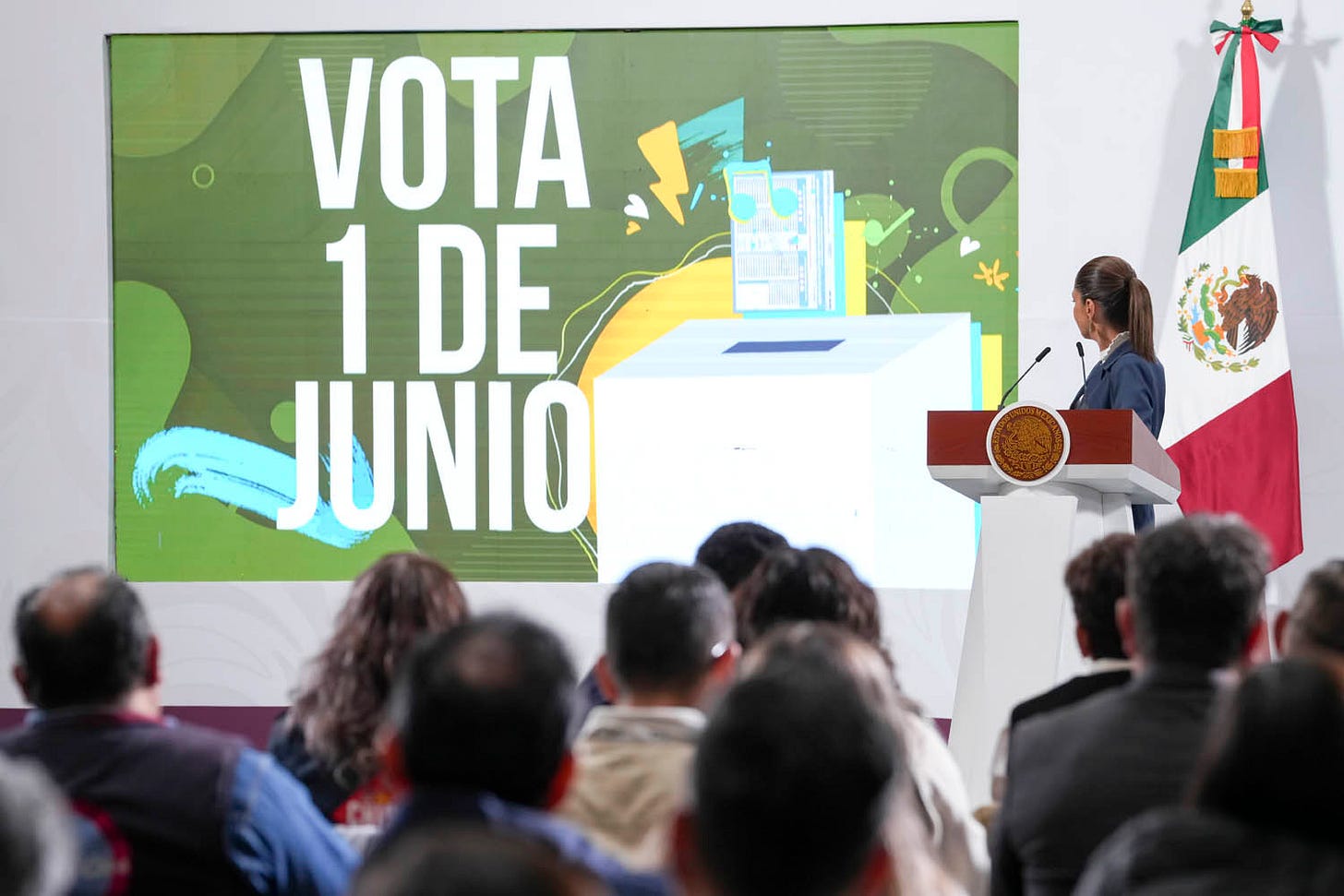To vote, or not to vote?
Closing arguments before the judicial election, plus what I'm reading
Welcome to The Mexpatriate.
In today’s newsletter, I provide a season recap ahead of the historic judicial election on Sunday, and links to what I’m reading (and listening to).
The judicial election campaigns officially ended yesterday, though it’s hard to tell. The narrow confines imposed on candidates have made it a stealth campaign season, but now the next phase of this audacious experiment is about to begin. The complexity of this election is hard to capture, from the number of candidates on the multiple ballots to the Herculean labor required to organize the elections and tally the votes, everything about it is massive in scale. Well, everything except the estimated turnout.
Below you’ll find a snapshot from the national conversation, a selection of quotes orbiting around the question: to vote, or not to vote? That is the question, at least everywhere you look in the media this week—but to the average Mexican going about her daily life, it might just be answered with another question. Vote for what?

A poll published this week in El Universal found that only 50% of respondents are aware there’s a judicial election in June. The National Electoral Institute (INE) has predicted a turnout of 13-20% of eligible voters, and a poll published in El País found that 22.9% knew the election date and expressed intention to vote (pollsters have noted that respondents tend to overestimate likelihood of voting). This same poll reported that 72% agree with the statement that the election is “necessary” and 65% that it will increase trust and legitimacy of the judicial system.
This election participation debate echoes the 2022 recall referendum, when on one side you had AMLO and Morena cheering on the vote, while the opposition struggled to unite around an effective boycott. The outcome didn’t surprise anyone: turnout was low (about 17%), and those who did make it to the polling booths were largely AMLOvers. But this time, instead of answering a single question on a ballot, voters will be presented with a rainbow of six different ballots for the federal judiciary, plus additional ones for local elections in 19 states. And the outcome of this election will have exponentially greater—and more unpredictable—consequences.
Electing all judges by popular vote is historically unprecedented, not just nationally but globally. To Claudia Sheinbaum and Morena, this makes Mexico a democratic innovator; to their critics, an accident waiting to happen.
But even if the intention behind this constitutional reform was to radically overhaul a judicial system that many Mexicans view as corrupt and inefficient, the election may end up bringing less substantive change than the reformers or the defenders of the judicial system anticipate.
In some cases, the outcome of the election is a foregone conclusion, since there is only one candidate on the ballot for certain positions. The most striking case is Durango, where there are 49 candidates for 49 state judgeships. “People were promised they would be able to choose their judges, and in these cases, whether they vote or not, nothing will change. It would be like having only one candidate for President,” notes Laurence Pantin, director of Juicio Justo, in El País. At the federal level, an analysis by El País found that 135 candidates face minimal competition for their positions.
The opposition has lamented that Mexico’s judicial system will be completely hijacked by Morena partisans, and while the ruling party is undoubtedly at an advantage here, it would be disingenuous to think that the judiciary roster as it is today is neutral and non-partisan, or that other political and economic interests haven’t had any influence in the selection of candidates. According to one analysis, 36% of the 117 candidates for the higher-level federal court positions are aligned with Morena, 9% are aligned with opposition parties and the rest are categorized as independent. Also, 58% of these candidates have already worked as judges or as other functionaries in the federal courts.
So what does this all mean for the aftermath of the election?
The INE will announce estimates of voter turnout on Sunday night, but official results won’t start to be released until Monday. The new judiciary takes office on September 1, and it seems likely this summer will bring accusations of fraud, contested races and further delays for those already caught up in the judicial system.
Those who can afford it will probably use other forms of arbitration to avoid the courts (as many do already), while the less privileged will have no choice but to muddle through a clogged system (as they do now).
And now, here is a selection of voices from the national debate, with closing arguments in favor—or not—of voting on Sunday.
“The election on Sunday isn’t about whether you are in favor of or against selecting judges by popular vote. It’s about who will hold those positions. This isn’t a plebiscite on the reform. Abstinence isn’t resistance, it’s resignation.”
—Carlos Pérez Ricart, analyst and academic
“Democratic participation is not limited to the act of voting. It also involves deliberation, demanding accountability, calling out flawed processes, and exposing the simulations of power…Not voting can be an active way of preserving the value of what it means to vote and the defense of what has cost us so much to achieve in this country.”
—Juan Jesús Garza Onofre, legal scholar
“I don’t like the reform either…However, I am going to vote. I will vote because we’re already lost the battle to ‘validate’ the election. The election is already valid. The judicial reform is now in the constitution and its results will be binding, regardless of the number of people who participate. This is the reality.”
—Viri Ríos, academic and journalist
“I can’t find worthy cause to vote in June because voting blind is not voting. He or she who votes blind cannot take responsibility for the vote cast.”
—Jesús Silva-Herzog Márquez, journalist and professor
“Going to vote—that is, going to a polling station and putting a piece of paper in the ballot box—is the most passive form of participation…What worries me is that the day after the election, some people will say ‘That’s it! We’ve reformed our judicial system! It’s all good,’ and on the other side, people will say ‘That’s it! Justice is over in Mexico, there’s nothing to be done…’ That’s the question for me. What happens after June 1?”
—Carla Escoffié, lawyer and activist
“The history of voter abstention movements in this country has never been successful. Telling people not to vote has never been a successful strategy. I think we have to take advantage of any opportunity to influence the judicial reform. It’s been approved and it’s disastrous, but if citizens don’t get out to vote, what will happen is Morena will mobilize its base and they will end up shaping the new judiciary.”
—Josafat Cortez, legal scholar
“In conclusion, each person will choose how to respond to the call to the polls, but if you unequivocally do not believe in this election—right now, under these conditions that favor the dispersion of the non-ruling party vote—it might be worth remembering the aforementioned novel by Saramago, where power is shaken not by a loud outcry, but by the silent multitude that refuses to legitimize what it deems unacceptable. Perhaps, on this occasion, the most eloquent way to say ‘no’ is, quite simply, to say nothing at all.”
—Eduardo Muñiz Trejo, professor
“It seems to me an absurd, absolutely complex election. I will go [to the voting booth] with my cheat sheet, I don’t see how else to do it…But this is the triumph of revenge, the triumph of a political decision of one power against another that yes, did indeed need reform, but will not lead to a better judicial system.”
—Denise Maerker, journalist
Here is a recap of previous judicial reform/election coverage from The Mexpatriate:
A deep dive on the judicial reform:
An overview of the judicial candidate selection process:
Highlights from the judicial election campaigns:
What I’m reading (and listening to)
El nuevo laberinto de Israel Vallarta, atrapado entre la reforma judicial y la obsesión de la FGR (El País)
The case of Israel Vallarta is one (of many) individual stories that illuminate the systemic flaws and contradictions of the Mexican judicial system, particularly in criminal cases. Vallarta has been in prison for over 19 years without a sentence, and his case could be further delayed if the judge reviewing it loses in the judicial election. Meanwhile, the attorney general, Alejandro Gertz Manero, has acknowledged the state’s case against Vallarta was a setup—a well-documented one—but his office is nonetheless seeking a 329-year sentence.
Indigenous activist’s disappearance and killing cause outcry in Mexico’s Oaxaca state (LA Times) + Sandra Domínguez y el riesgo de ser activista en México (Semanario Gatopardo)
On April 24, the bodies of Sandra Domínguez and her husband, Alexander Hernández, were found in the state of Veracruz—they had been missing from their home in Oaxaca since October. Domínguez was a vocal activist for indigenous women and was no stranger to threats. Oaxaca law enforcement is blaming organized crime for the homicides, with the state prosecutor alleging that Hernández was involved in illicit activity, but Domínguez’s friends and colleagues point to the state. To go deeper on this case and the broader issue of violence against human rights and environmental activists in Mexico, check out the Semanario Gatopardo podcast episode linked above.
Contra la gentrificación del hongo silvestre mexicano (Gatopardo)
I have an abiding fascination for fungi—a kingdom both earthbound and otherworldly—so this article was clickbait for me. Mexico is home to vast fungal biodiversity and “herencia honguera” as documented by the subject of this article, Amaranta Ramírez, a biologist and co-author of “A gastronomic dictionary of Mexican mushrooms.” She highlights how essential the preservation of ancestral local knowledge is to mycology and safe consumption of mushrooms, and also talks of “gourmetization” of what used to be “the poor man’s meat.”
A Mexican pharmacy chain revolutionised health care at home (The Economist) + Health nearshoring (MexMoves)
This brief write-up about Farmacias Similares notes the challenges the highly successful chain will face in trying conquer the U.S. frontier, though it’s a market that is ripe for more accessible health care options. On the related topic of “health nearshoring,” I’d recommend listening to the interview with Bismarck Lepe, the Mexican-American founder of a digital health platform that serves U.S. patients (MiSalud Health) in the episode of MexMoves podcast linked above.
Graciela Iturbide: Fotografiar pueblos indígenas no es realismo mágico, es la vida (El País)
A delightful interview with a living legend of Mexican photography, 83-year-old Graciela Iturbide, who recently won Spain’s prestigious Princesa de Asturias Award. Iturbide is known for her photographs of women and for her visual chronicle of the community of Juchitán, Oaxaca over the course of six years of visits. Here she explains her rejection of the label of “surrealism” or “magical realism” applied to her work: “Photographing indigenous peoples isn’t magical realism, it’s life.”
Thank you for reading and feel free to send me your suggestions, comments and questions at hola@themexpatriate.com. If you’d like to support my work and get full access to every newsletter, consider upgrading to a paid subscription below.









I am flabbergasted by these judicial elections, and mostly just can’t figure out what anyone thinks will change…the scale alone makes it an impossible operation, at least if you want to give it any validity at all.
I’d rather Mexicans be able to elect their local police force…now THAT would make a difference in the average citizen’s relationship with the justice system!
Nice work, Kate! Hope all is well.